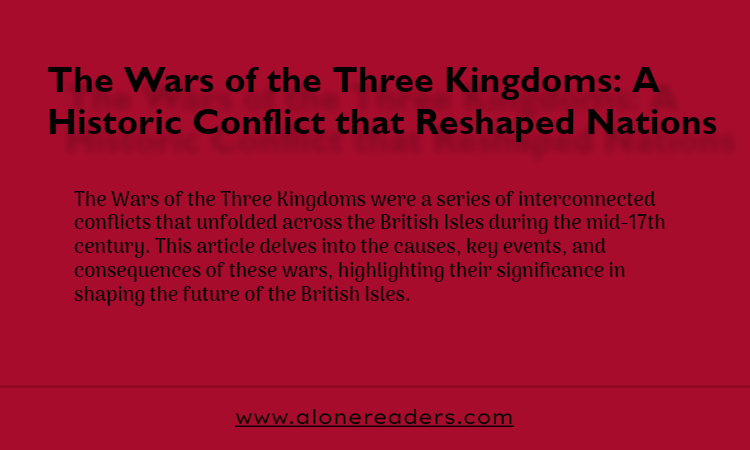
The Wars of the Three Kingdoms were a series of interconnected conflicts that unfolded across the British Isles during the mid-17th century. Spanning over two decades, this tumultuous period witnessed the collision of political, religious, and social ideologies, ultimately leading to a radical reconfiguration of power structures in England, Scotland, and Ireland. This article delves into the causes, key events, and consequences of these wars, highlighting their significance in shaping the future of the British Isles.
The seeds of the Wars of the Three Kingdoms were sown in the early 17th century, during a time of immense political and religious upheaval. England, under the reign of King James I, experienced tensions between the monarchy and Parliament, as well as religious divisions between Anglicans and Puritans. Meanwhile, Scotland was grappling with its own religious and political struggles, particularly regarding the imposition of Anglican liturgy by James I and later Charles I. In Ireland, the native Irish Catholics faced discrimination under English rule, further exacerbating the existing tensions.
The English Civil War was the central conflict of the Wars of the Three Kingdoms and is often regarded as the pivotal event of this era. The war erupted when the escalating power struggle between King Charles I and Parliament reached a breaking point. Supporters of the king, known as Royalists or Cavaliers, and the Parliamentarians or Roundheads, led by Oliver Cromwell, engaged in a bitter and protracted struggle for control of the English government.
The conflict witnessed a series of key battles, such as the Battle of Edgehill, Marston Moor, and Naseby, each shifting the balance of power. The Parliamentarians ultimately emerged victorious, culminating in the trial and execution of King Charles I in 1649. England was transformed into a republic, known as the Commonwealth of England, and later the Protectorate under Cromwell's leadership.
While the English Civil War raged on, Scotland also experienced its own series of conflicts, known as the Scottish Wars. Initially sparked by religious tensions and resistance against Charles I's religious policies, the Scottish Covenanters, led by figures like Archibald Campbell, Marquess of Argyll, and Alexander Leslie, clashed with royalist forces.
The Covenanters, who sought to preserve Scottish Presbyterianism, formed an alliance with the English Parliamentarians against the Royalists. However, after the execution of Charles I, Scotland found itself under Cromwell's rule, leading to continued friction between the two nations. The Scottish Wars culminated in the Battle of Worcester in 1651, where the Scottish Royalists were decisively defeated by Cromwell's forces.
While England and Scotland were embroiled in their respective conflicts, Ireland experienced its own violent upheaval. The Irish Confederate Wars erupted in 1641 when the Irish Catholic gentry, fearing persecution, rebelled against English Protestant settlers. The conflict initially revolved around Irish demands for greater political autonomy and the restoration of Catholic rights.
The Irish Confederates, led by figures like Owen Roe O'Neill and Garret Barry, achieved significant military successes against English and Scottish forces in the early stages of the war. However, internal divisions and the arrival of Cromwell's New Model Army in 1649 turned the tide against the Confederates. Cromwell's brutal campaigns, such as the sieges of Drogheda and Wexford, resulted in the subjugation of Ireland and the devastation of its Catholic population.
The Wars of the Three Kingdoms had far-reaching consequences for the British Isles. The establishment of the Commonwealth of England, although short-lived, marked a radical departure from traditional monarchical rule. The execution of Charles I sent shockwaves across Europe and challenged the divine right of kings.
The wars also accelerated the spread of revolutionary ideas, with political and religious debates reshaping societal norms. The emergence of figures like Oliver Cromwell, who later became Lord Protector, further exemplified the changing political landscape. The conflicts left deep scars on the fabric of society, fostering sectarian divisions that persisted for generations.
Moreover, the Wars of the Three Kingdoms further cemented England's dominance over Scotland and Ireland, leading to the subsequent Act of Union between England and Scotland in 1707. However, the effects of these conflicts continued to reverberate, contributing to ongoing political debates surrounding devolution and the potential breakup of the United Kingdom in modern times.
The Wars of the Three Kingdoms were a complex series of conflicts that reshaped the political, religious, and social landscapes of the British Isles during the mid-17th century. The English Civil War, the Scottish Wars, and the Irish Confederate Wars intertwined in a web of violence, political maneuvering, and ideological clashes. These wars left an indelible mark on the history of the British Isles, highlighting the transformative power of revolution, the fragility of political institutions, and the enduring legacy of sectarian divisions.